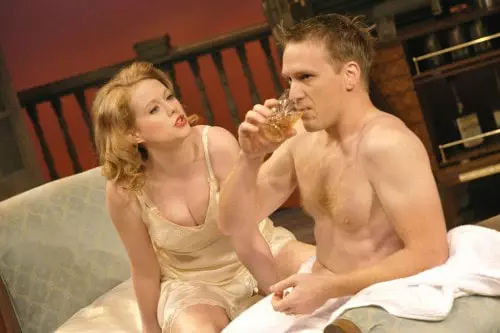On the very first press night of Cat On A Hot Tin Roof, one theatre reviewer damned it as “a stunningly acted play of evasion”. The gist of the criticism was that the young male protagonist, Brick Pollitt, was either homosexual, or he wasn’t; the play ought to come clean and spell out the sexual orientation of its main character. Tennessee Williams responded with a beautifully written “defence of these so called ambiguities of character in my plays.”
The piece is called, Critic says “Evasion”, Writer Says “Mystery”, and its message seems as relevant to current theatre criticism as it was back in the 1950’s, though for entirely opposite reasons. Nowadays reviewers are comfortable speaking about what couldn’t be admitted back then. Sexual orientation doesn’t have to be secret. There’s no need for evasion. Ambiguity is irrelevant. In the words of Michael Billington, “Brick has to accept that his alcoholism and refusal to sleep with his wife, Maggie, are the result not just of guilt over the death of his friend, Skipper, but of his repressed homosexuality.” That phrase “repressed homosexuality” or variations of it gets repeated and recycled throughout most of the theatre reviews I’ve read recently, on blogs as well as in the papers. Mystery solved.
Somehow, I don’t think Tennessee Williams would agree.There’s no evidence in the text of the play for this assertion, or in anything he wrote subsequently about the play. And there’s certainly no hint of it in the performance I saw at West Yorkshire Playhouse last week. Fortunately the reviews were too late to affect the director or the actors, and I think anyone who saw the production with fresh eyes would not come to the conclusion that they knew for certain everything about the characters and what they had or had not to accept. The play, quite properly, leaves us wondering.
In the stage note that Tennessee Williams quotes in his essay – from the second act at the point where Big Daddy alludes to the rumours about Brick’s relationship with his dead friend, Skipper – the charge of homosexuality is explicitly refuted:
The thing they are discussing, timidly and painfully on the side of Big daddy, fiercely, violently on Brick’s side, is the inadmissible thing that Skipper and Brick would rather die than live with.The fact that if it existed it had to be disavowed to “keep face” in the world they lived in, a world of popular heroes, may be at the heart of the “mendacity” that Brick drinks to kill his disgust with. It may be at the root of his collapse. Or it may be only a single manifestation of it, and not even the most important. The bird that I hope to catch in the net of this play is not the solution to one man’s psychological problem. I’m trying to catch the true quality of experience in a group of people, that cloudy, flickering, evanescent – fiercely charged! – interplay of live human beings in the thundercloud of a common crisis. Some mystery should be left in the revelation of character in the play, just as a great deal of mystery is always left in the revelation of character in life, even in one’s own character to himself. This does not absolve the playwright of his duty to observe and probe as clearly and deeply as he legitimately can; but it should steer him away from “pat” conclusions, facile definitions, which make a play just a play, not a snare for the truth of human experience.
Brick has resigned from life, retired from the field. He refuses to grow up and accept adult responsibilities and limitations, including sexuality. This does not make him gay, however, even unconsciously. He certainly isn’t “normal” by the dominant standards of 1950’s American culture, but it does him no favours to try to slot him into current sexual standards, fix him with stable character traits and “normalise” him by the back door (a regrettable image, but I’m writing fast.)
Williams wrote a letter of thanks to the second actor ever to play Brick, praising him for acting him “precisely as I had conceived the character. You had the quality which I think of as ‘the poem of the play’ – the poetry of a man who is not competing.” What I think was wonderful about the production at the Playhouse was that it was true to Williams’ vision; the poetry of a man who is not competing shone through every moment of the performance, and the characters remained a mystery and alive with uncertainty, just as the playwright intended.
I’m going to end with the last paragraph from his essay, explaining how he wanted people to feel after watching the play, as I don’t really think it can be bettered. There’s only one night left, here’s what you are missing:
I want people to leave the theatre as they do leave it every night, feeling that they have met with a vividly allusive, as well as disturbingly elusive, fragment of human experience, one that not only points at truth but at the mysteries of it, much as they will leave this world when they leave it, still wondering somewhat what happened to them, and for what reason or purpose.

I like it when folks get together and share views.
Great blog, stick with it!